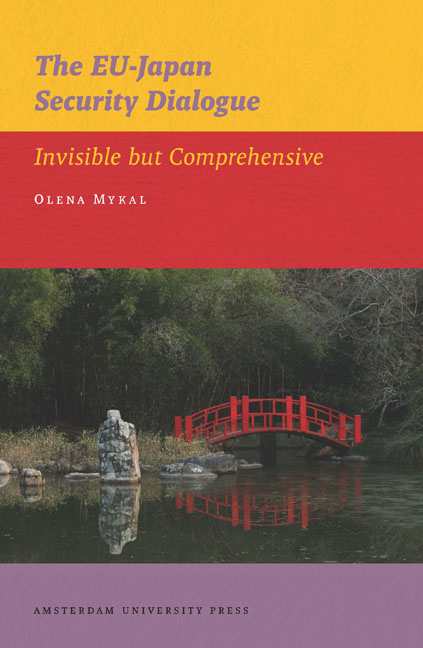Book contents
- Frontmatter
- Dedication
- Contents
- Abbreviations
- Acknowledgements
- Preface
- Introduction
- PART ONE DEVELOPING CONCEPTIONS OF SECURITY AND JOINT AGENDA OF THE EU-JAPAN SECURITY DIALOGUE
- PART TWO COMMON INTERESTS IN THE EU-JAPAN SECURITY DIALOGUE: ANALYSIS OF JOINT ACTIVITIES
- Conclusion
- About the Author
- Notes
- Bibliography
- Index
- Publications Series
1 - The Cold War and the EC-Japan Security Dialogue (1959-1990)
Published online by Cambridge University Press: 22 January 2021
- Frontmatter
- Dedication
- Contents
- Abbreviations
- Acknowledgements
- Preface
- Introduction
- PART ONE DEVELOPING CONCEPTIONS OF SECURITY AND JOINT AGENDA OF THE EU-JAPAN SECURITY DIALOGUE
- PART TWO COMMON INTERESTS IN THE EU-JAPAN SECURITY DIALOGUE: ANALYSIS OF JOINT ACTIVITIES
- Conclusion
- About the Author
- Notes
- Bibliography
- Index
- Publications Series
Summary
This chapter focuses on the examination of the establishment and evolution of the security dialogue between the EU and Japan during the Cold War. This chapter presents a twofold argument. Firstly, it argues that it was during the Cold War period that the European Community and Japan initiated their security dialogue, one that started to encompass several areas of cooperation that had traditionally been considered ‘low politics’ issues, such as the environment. The second argument is that, because the aforementioned ‘low politics’ issues were the core items of European and Japanese security conceptualisations, they were naturally introduced into the EC-Japan security dialogue.
To support these contentions, this chapter is organised in three parts. The first part examines the conceptualisation of security in Japan during the Cold War. The second part deals with the conceptualisation of security in Europe during the same period. The third, and central part of the study is subdivided into five sections. The first section describes the mutual images and perceptions of Europe and Japan and their policies towards each other in the 1950s; the second section discusses Japanese initiatives with regard to EC-Japan cooperation and the European response in the early 1960s; the third section demonstrates how internal conflicts within the EC undermined Japanese eagerness to establish a security dialogue in the mid-late 1960s; the fourth section examines the reasons for, and the environment in which, the security dialogue had been established by the 1970s; the fifth section describes and analyses the evolution of the security dialogue in the 1980s. It should be emphasised that the first three sections, which describe the state of EC-Japan relations prior to the establishment of a security dialogue, are essential and integral parts of the analysis as the mutual images and perceptions discussed in them affect the state of the ensuing security dialogue.
This chapter will also demonstrate that historical events influenced the initiation and the further development of the security dialogue, which corresponds to the framework of analysis.
The Conceptualisation of Security in Japan During the Cold War
The end of the Second World War brought significant changes to Japan. For seven years (1945-1952) it was under the American occupation regime, at which time all of the primary state institutions were reshaped and their ideology reformulated. Japan was not sovereign.
- Type
- Chapter
- Information
- The EU-Japan Security DialogueInvisible but Comprehensive, pp. 37 - 60Publisher: Amsterdam University PressPrint publication year: 2012



